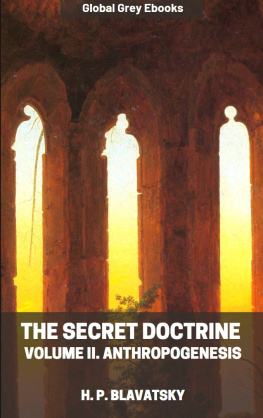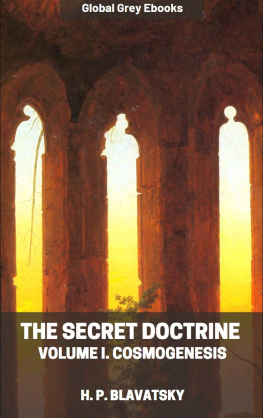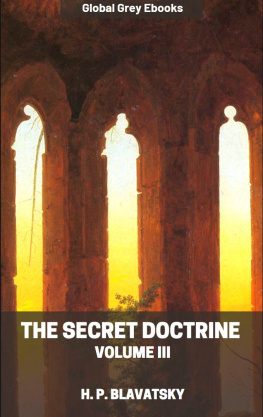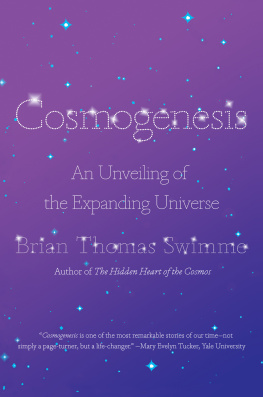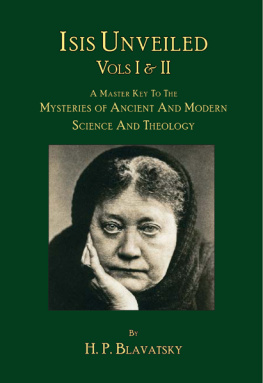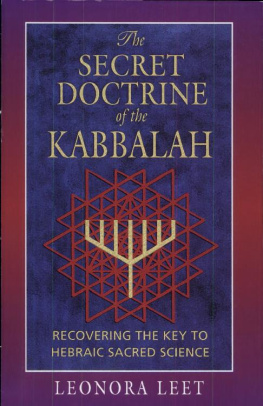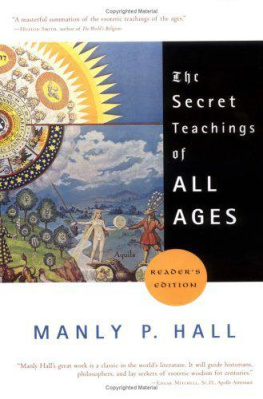THE SECRET DOCTRINE
The Synthesis of Science, Religion, and Philosophy
VOLUME 1: COSMOGENESIS
H. P. BLAVATSKY

This 2012 edition published by Barnes & Noble, Inc.
All rights reserved. No part of this publication may be reproduced, stored in a retrieval system, or transmitted, in any form or by any means, electronic, mechanical, photocopying, recording, or otherwise, without prior written permission from the publisher.
Barnes & Noble, Inc.
122 Fifth Avenue
New York, NY 10011
ISBN: 978-1-4114-6512-1
INTRODUCTORY
"Gently to hear, kindly to judge."
SHAKESPEARE.
S INCE the appearance of Theosophical literature in England, it has become customary to call its teachings "Esoteric Buddhism." And, having become a habitas an old proverb based on daily experience has it"Error runs down an inclined plane, while Truth has to laboriously climb its way up hill."
Old truisms are often the wisest. The human mind can hardly remain entirely free from bias, and decisive opinions are often formed before a thorough examination of a subject from all its aspects has been made. This is said with reference to the prevailing double mistake (a) of limiting Theosophy to Buddhism: and (b) of confounding the tenets of the religious philosophy preached by Gautama, the Buddha, with the doctrines broadly outlined in "Esoteric Buddhism." Any thing more erroneous than this could be hardly imagined. It has enabled our enemies to find an effective weapon against theosophy; because, as an eminent Pali scholar very pointedly expressed it, there was in the volume named "neither esotericism nor Buddhism." The esoteric truths, presented in Mr. Sinnett's work, had ceased to be esoteric from the moment they were made public; nor did it contain the religion of Buddha, but simply a few tenets from a hitherto hidden teaching which are now supplemented by many more, enlarged and explained in the present volumes. But even the latter, though giving out many fundamental tenets from the S ECRET D OCTRINE of the East, raise but a small corner of the dark veil. For no one, not even the greatest living adept, would be permitted to, or couldeven if he wouldgive out promiscuously, to a mocking, unbelieving world, that which has been so effectually concealed from it for long ons and ages.
"Esoteric Buddhism" was an excellent work with a very unfortunate title, though it meant no more than does the title of this work, the "S ECRET D OCTRINE ." It proved unfortunate, because people are always in the habit of judging things by their appearance, rather than their meaning; and because the error has now become so universal, that even most of the Fellows of the Theosophical Society have fallen victims to the same misconception. From the first, however, protests were raised by Brahmins and others against the title; and, in justice to myself, I must add that "Esoteric Buddhism" was presented to me as a completed volume, and that I was entirely unaware of the manner in which the author intended to spell the word "Budh-ism."
This has to be laid directly at the door of those who, having been the first to bring the subject under public notice, neglected to point out the difference between "Buddhism"the religious system of ethics preached by the Lord Gautama, and named after his title of Buddha, "the Enlightened"and Budha, "Wisdom," or knowledge (Vidya), the faculty of cognizing, from the Sanskrit root "Budh," to know. We theosophists of India are ourselves the real culprits, although, at the time, we did our best to correct the mistake. (See Theosophist, June 1883.) To avoid this deplorable misnomer was easy; the spelling of the word had only to be altered, and by common consent both pronounced and written "Budhism," instead of "Buddhism." Nor is the latter term correctly spelt and pronounced, as it ought to be called, in English, Buddhasm, and its votaries "Buddhasts."
This explanation is absolutely necessary at the beginning of a work like this one. The "Wisdom Religion" is the inheritance of all the nations, the world over, though the statement was made in "Esoteric Buddhism" (Preface to the original Edition) that "two years ago (i.e. 1883), neither I nor any other European living, knew the alphabet of the Science, here for the first time put into a scientific shape," etc. This error must have crept in through inadvertence. For the present writer knew all that which is "divulged" in "Esoteric Buddhism"and much moremany years before it became her duty (in 1880) to impart a small portion of the Secret Doctrine to two European gentlemen, one of whom was the author of "Esoteric Buddhism"; and surely the present writer has the undoubted, though to her, rather equivocal, privilege of being a European, by birth and education. Moreover, a considerable part of the philosophy expounded by Mr. Sinnett was taught in America, even before Isis Unveiled was published, to two Europeans and to my colleague, Colonel H. S. Olcott. Of the three teachers the latter gentleman has had, the first was a Hungarian Initiate, the second an Egyptian, the third a Hindu. As permitted, Colonel Olcott has given out some of this teaching in various ways; if the other two have not, it has been simply because they were not allowed: their time for public work having not yet come. But for others it has, and the appearance of Mr. Sinnett's several interesting books is a visible proof of the fact. It is above everything important to keep in mind that no theosophical book acquires the least additional value from pretended authority.
In etymology Adi, and Adhi Budha, the one (or the First) and "Supreme Wisdom" is a term used by Arysanga in his Secret treatises, and now by all the mystic Northern Buddhists. It is a Sanskrit term, and an appellation given by the earliest Aryans to the Unknown deity; the word "Brahm" not being found in the Vedas and the early works. It means the absolute Wisdom, and "Adi-bhta" is translated "the primeval uncreated cause of all" by Fitzedward Hall. ons of untold duration must have elapsed, before the epithet of Buddha was so humanized, so to speak, as to allow of the term being applied to mortals and finally appropriated to one whose unparalleled virtues and knowledge caused him to receive the title of the "Buddha of Wisdom unmoved." Bodha means the innate possession of divine intellect or "understanding"; "Buddha," the acquirement of it by personal efforts and merit; while Buddhi is the faculty of cognizing the channel through which divine knowledge reaches the "Ego," the discernment of good and evil, "divine conscience" also; and "Spiritual Soul," which is the vehicle of Atma. "When Buddhi absorbs our E GO -tism (destroys it) with all its Vikaras, Avalkitshvara becomes manifested to us, and Nirvana, or Mukti, is reached," "Mukti" being the same as Nirvana, i.e., freedom from the trammels of "Maya" or illusion. "Bodhi" is likewise the name of a particular state of trance condition, called Samadhi, during which the subject reaches the culmination of spiritual knowledge.
Unwise are those who, in their blind and, in our age, untimely hatred of Buddhism, and, by re-action, of "Budhism," deny its esoteric teachings (which are those also of the Brahmins), simply because the name suggests what to them, as Monotheists, are noxious doctrines. Unwise is the correct term to use in their case. For the Esoteric philosophy is alone calculated to withstand, in this age of crass and illogical materialism, the repeated attacks on all and everything man holds most dear and sacred, in his inner spiritual life. The true philosopher, the student of the Esoteric Wisdom, entirely loses sight of personalities, dogmatic beliefs and special religions. Moreover, Esoteric philosophy reconciles all religions, strips every one of its outward, human garments, and shows the root of each to be identical with that of every other great religion. It proves the necessity of an absolute Divine Principle in nature. It denies Deity no more than it does the Sun. Esoteric philosophy has never rejected God in Nature, nor Deity as the absolute and abstract


